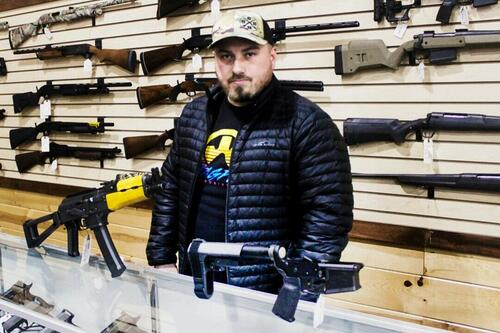Authored by Tom Ozimek via The Epoch Times,
A federal appeals court in North Dakota has found that a rule issued by the Bureau of Alcohol Tobacco, Firearms and Explosives (ATF) that restricts ownership of pistol attachments known as stabilizing braces is “arbitrary and capricious,” ordering a lower court to re-consider a motion that would block enforcement of the brace ban.
In a 2–1 decision issued on Aug. 9 by the 8th Circuit Court of Appeals, the majority found that a coalition of 25 Republican attorneys are likely to succeed in their legal challenge against the ATF rule that treats pistols fitted with stabilizing braces as short-barreled rifles and subjects them to various restrictions.
“The Final Rule, as a whole, is arbitrary and capricious because it allows the ATF to arrive at whatever conclusion it wishes without ‘adequately explain[ing] the standard on which its decision is based,’” the majority opinion states. “Thus, we conclude the Coalition is likely to succeed on the merits of its challenge.”
The states and other plaintiffs sued the ATF in February 2023, with U.S. District Judge Daniel Hovland in North Dakota declining to grant their motion for a preliminary injunction and block the rule. Arguing that they were unlikely to succeed on the merits, Hovland found that ATF had adequately explained its rulemaking process.
The majority on the 8th Circuit disagreed, and in their Aug. 9 decision ordered Hovland to reconsider the plaintiffs’ motion for a injunction that would block the ATF rule’s enforcement.
“We reverse the order denying a preliminary injunction and remand with instructions to reconsider the motion consistent with this opinion,” the judges wrote in the majority opinion.
Circuit Judge Bobby Shepherd dissented, saying that the panel should have affirmed Hovland’s order because there was no need for a preliminary injunction after the rule was vacated in June by U.S. District Judge Reed O'Connor in Texas.
O'Connor argued in his 12-page decision that the ATF’s rule that treated roughly 99 percent of pistols fitted with the braces as short-barreled rifles violated the Administrative Procedures Act’s procedural requirements because it was not a “logical outgrowth” of the proposed version of the rule.
“The Court finds that the adaptation of the Final Rule was arbitrary and capricious for two reasons,” O'Connor wrote. “First, the Defendants did not provide a detailed justification for their reversal of the agency’s longstanding position. And second, the Final Rule’s standards are impermissibly vague.”
The judge granted the plaintiffs’ motion for summary judgment and ordered the rule vacated.
The ATF told The Epoch Times that it had no comment on the 8th Circuit ruling.
Iowa Attorney General Brenna Bird and Missouri Attorney General Andrew Bailey, who were among the 25 attorneys general who challenged the ATF rule, praised the 8th Circuit ruling.
“This victory upholds Americans’ constitutional rights and stops the Biden-Harris ATF’s illegal attempt to make millions of law-abiding citizens felons overnight,” Bird said in a statement.
Bailey issued a statement saying: “The Constitution was meant to be a floor, not a ceiling, for our God-given rights. We will continue to do everything in our power to safeguard Missourians’ right to keep and bear arms against encroachment by unelected federal bureaucrats.”
The pistol stabilizing brace, introduced over a decade ago, was designed to aid disabled individuals and others who require assistance when shooting large-format pistols, such as those built on AR-15 platforms. This accessory attaches to the rear of the pistol and the shooter’s forearm, providing a steadier aim for one-handed shooting.
Restrictions on stabilizing braces have been the subject of intense debate after the ATF proposed them in 2020. Initially, the ATF said in open letters that it did not consider the braces as converting pistols into short-barreled rifles but in the final rule, the agency cited changes in the braces’ design in saying they convert pistols into restricted short-barreled rifles.
In January 2023, the DOJ announced that it had submitted the final rule to the Federal Register, formalizing the regulation that President Joe Biden advocated for in April 2020 after it was found that a man killed 10 people at a grocery store in Boulder, Colorado, using a gun with a stabilizing brace.
The rule went into effect immediately upon publication. Any firearms with stabilizing braces or similar attachments that qualified them under the new rule as short-barreled rifles had to be registered no later than within 120 days, or modified by removing the brace and restored into a regular pistol, or turned into a local ATF office, or destroyed.
Short-barreled rifles are subject to more strict regulations under the National Firearms Act (NFA), with those found in possession of unregistered NFA firearms can face fines of up to $10,000, 10 years in prison, and a felony conviction that disqualifies them from future firearm ownership.
The rule faced pushback from Republicans and gun-rights groups like the National Rifle Association, which pointed out they were originally designed for disabled veterans.
The rule faced several legal challenges. In one of the lawsuits, the 5th Circuit Court of Appeals determined in August 2023 that the rule was finalized without giving the public a meaningful chance to comment on it, in violation of the federal Administrative Procedure Act, which sent the case to O'Connor in Texas, who in June this year vacated the rule, setting up a possible U.S. Supreme Court appeal.
The number of Americans impacted by the ATF’s brace rule is difficult to determine. The ATF estimates that 3 million pistol braces have been sold. Second Amendment advocates say the number is closer to 40 million.
